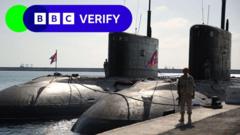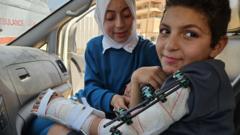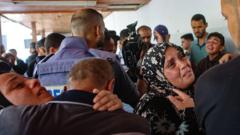As Russia reassesses its military presence in Syria, the situation at the Tartous naval facility poses questions about future engagements in the region.
Russian Naval Movements Raise Questions About Future in Syria

Russian Naval Movements Raise Questions About Future in Syria
Recent satellite images show Russian ships relocating from Tartous naval base, suggesting uncertainty in Moscow's military strategy post-Assad.
In a significant development, satellite imagery has revealed that Russian naval vessels have temporarily vacated the Tartous naval base in Syria, raising questions about the future of Moscow’s military strategy in the country following the decline of its ally, Bashar al-Assad. Images from December 10, provided by Maxar and analyzed by BBC Verify, indicate that some of these vessels are now stationed offshore in the Mediterranean Sea.
While Russian ships appear to be repositioning, activity at the Khmeimim airbase persists, with military jets clearly visible on the tarmac. Kremlin spokesman Dmitry Peskov acknowledged that discussions regarding Russia's military presence in Syria are underway and emphasized the importance of maintaining security for Russian facilities. "We're in contact with those controlling the situation in Syria to ensure our bases and diplomatic mission’s safety," he stated.
The Tartous facility, a key element of Russian naval operations, serves as the only repair and replenishment hub for Moscow in the Mediterranean and can accommodate submarines. Despite the current fleet's offshore positioning, it remains unclear if this withdrawal is permanent. Analysts have noted that recent movements of naval assets to and from Tartous may indicate precautionary measures, possibly in response to threats from Syrian rebel forces or potential Israeli strikes.
Frederik Van Lokeren, a former naval officer, suggested that the fleet is enduring a transitional phase as Russia considers its next steps. Some experts speculate that if Moscow decides to relinquish the Tartous base, it might look to shift its operations closer to forces in Libya, where there are backing connections.
In contrast, there are no indications of an imminent evacuation from the Khmeimim airbase, which has played a vital role in Russia's military efforts in the Middle East since 2015. Satellite images show significant aerial assets still stationed there, including heavy transport aircraft and helicopters, further suggesting Russia's ongoing commitment to maintaining its military foothold in the region.
As the dynamics unfold, influential military analysts highlight the precarious situation Russia finds itself in, with one pro-Kremlin commentator warning that Moscow's military influence in the Middle East is "hanging by a thread." The evolving scenario sparks discussions around the future of Russian operations in Syria and the broader geopolitical implications of potential military retraction.
While Russian ships appear to be repositioning, activity at the Khmeimim airbase persists, with military jets clearly visible on the tarmac. Kremlin spokesman Dmitry Peskov acknowledged that discussions regarding Russia's military presence in Syria are underway and emphasized the importance of maintaining security for Russian facilities. "We're in contact with those controlling the situation in Syria to ensure our bases and diplomatic mission’s safety," he stated.
The Tartous facility, a key element of Russian naval operations, serves as the only repair and replenishment hub for Moscow in the Mediterranean and can accommodate submarines. Despite the current fleet's offshore positioning, it remains unclear if this withdrawal is permanent. Analysts have noted that recent movements of naval assets to and from Tartous may indicate precautionary measures, possibly in response to threats from Syrian rebel forces or potential Israeli strikes.
Frederik Van Lokeren, a former naval officer, suggested that the fleet is enduring a transitional phase as Russia considers its next steps. Some experts speculate that if Moscow decides to relinquish the Tartous base, it might look to shift its operations closer to forces in Libya, where there are backing connections.
In contrast, there are no indications of an imminent evacuation from the Khmeimim airbase, which has played a vital role in Russia's military efforts in the Middle East since 2015. Satellite images show significant aerial assets still stationed there, including heavy transport aircraft and helicopters, further suggesting Russia's ongoing commitment to maintaining its military foothold in the region.
As the dynamics unfold, influential military analysts highlight the precarious situation Russia finds itself in, with one pro-Kremlin commentator warning that Moscow's military influence in the Middle East is "hanging by a thread." The evolving scenario sparks discussions around the future of Russian operations in Syria and the broader geopolitical implications of potential military retraction.





















